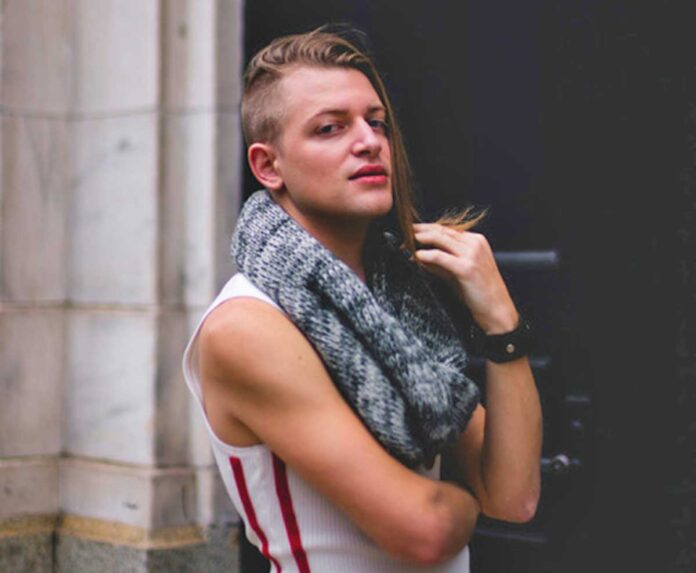“I think it’s so important for trans and nonbinary people to have music that is for them and written by them, and about their experience,” said Philly-based composer Pax Ressler, whose song “Love Song for Me” is part of “Anthology of New Music: Trans & Nonbinary Voices.” The collection of songs is the first of its kind written for and by trans and nonbinary people. Dennis Tobenski published the anthology through his company NewMusicShelf, and Aiden Feltkamp curated the collection.
The songs in the collection encompass all vocal ranges and musical genres, and they are diverse in their portrayal of what it means to be trans and nonbinary. Tobenski and Feltkamp laid out specific criteria for their songbook: that the composer or the lyricist be trans or nonbinary, or the song be written for or debuted by a trans or nonbinary vocalist.
Feltkamp initially approached Tobenski with their idea to assemble a collection of vocal music that focuses on trans and nonbinary identites.
“As a trans nonbinary singer, I often found opera and musical theater compositions to be aggressively gendered and binary,” Feltkamp said in a press release. “I was at a loss for repertoire that spoke to me.”
Tobenski, a gay man, could relate to the dearth of music that reflected his experiences.
“What did exist wasn’t exactly visible for a kid like me growing up gay in the cornfields of Illinois,” he said in a press release. “I was forced to either sing about loving women, co-opt soprano repertoire about loving men, or not sing about love at all.”
Some of the other songs in the anthology include “Captain of My Soul” by Yoshi Weinberg, “Loser Dumplings” by Melissa Li, “Let the Little Birds Sing” by Ashley Seward, “To my mother’s closet” by Dana Kaufman and “Open-Mouthed Gemini” by Penrose Allphin.
The pop, singer/songwriter vibe of “Love Song for Me” deviates from the style of most of the songs in the collection, which are rooted in classical or operatic genres.
“I hadn’t considered including singer-songwriter songs in the anthology, but Pax’s work fit the inclusion criteria and was simply too good not to include,” Feltkamp said in the press release.
“Love Song for Me,” is one of 10 songs on Ressler’s album that they wrote about themself as a nonbinary, genderfluid, transfeminine person in love. “I feel there’s so little representation of nonbinary people and trans people in love, especially with other nonbinary and trans people,” Ressler said.
Ressler’s song breaks the mold somewhat in that it is about their love for themself, “which I think is the queerest kind of love,” they added. They wanted to deviate from the archetype of romantic love on their album by including songs about love for friends they’ve lost and self love, in addition to romantic love.
“It’s interesting that our culture and music is so fixated on romantic love in general, that cisgender heterosexual romantic love is the keystone of all pop music,” Ressler said. “I think because of that, I was like, ‘if this is such a hallmark of music and why people write music, and that’s true for me too, then I want some queer, nonbinary music in my life.’ Creating that was important to me.”
Ressler’s work as a composer sits at the intersection of theater and music as well as art and advocacy. As a creator, performer, music director, designer and educator, they have worked at Philly’s Arden Theatre company, Bearded Ladies Cabaret, FringeArts, Theatre Exile, 1812 Productions and other local theater companies. Ressler has also written choral music for vocal ensembles throughout the U.S., and teaches private voice lessons. They’re looking forward to using the anthology as a teaching tool for their trans and nonbinary voice students, they said.
In discussing the vocal range of “Love Song for Me,” Ressler brought up a concept that they think may be forthcoming in terms of trans justice in music, which is using a digital keyboard to change the key of a musical production to accommodate a trans or nonbinary voice. “And not [use] voice type as a reason to exclude trans and nonbinary voices from particular songs or roles,” Ressler said.
The composer emphasized the importance of trans and nonbinary people having music written for them and by them to authentically highlight their experiences as non-cisgender people. They acknowledged the increase in portrayals of queer and trans characters in film and TV media, for example, but expressed their frustration at the fact that many of those stories aren’t written or directed by trans people.
“You get this strange minstrelcy of seeing, even trans characters played by cis actors where there’s just a lack of authenticity, and it can send really damaging messages to an audience about who trans people are,” Ressler said. “I think there’s something so magical and powerful about trans people writing their own narratives and stories, and them being portrayed and told by trans people who have those authentic experiences. A big passion project of mine as an artist is to allow trans people to tell their own stories and for them to be portrayed and told by trans people for a lot more authenticity and a more just way of giving opportunities, funding and compensation to trans people for their own narratives.”
To discover more of Ressler’s music, visit https://paxressler.com/.
